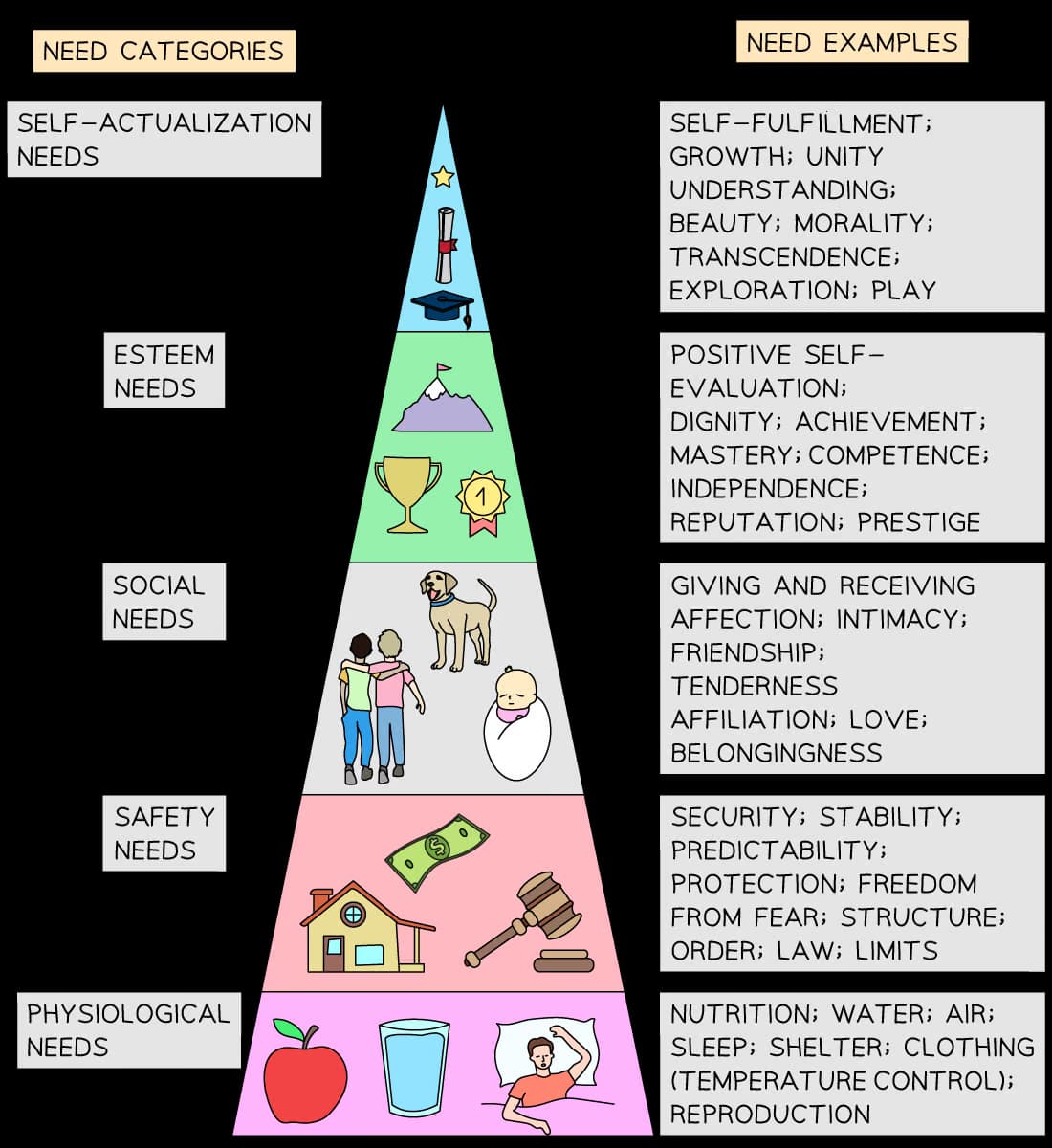Syllabus Edition
First teaching 2017
Last exams 2026
Free Will, Self-actualisation & Maslow's Hierarchy (AQA A Level Psychology): Revision Note
Exam code: 7182
Assumptions of the humanistic approach
The key assumptions of the humanistic psychology approach are
that each individual is unique
that humans have free will
that science should not be used to explain behaviour
that humans should be viewed holistically and not reduced to their parts
Free will assumes that humans are self-determining beings who can exercise control over their behaviour and that choice is a key part of this
It is in direct opposition to the behaviourist and the biological approaches which see behaviour as a response to either internal biological processes or to external conditioning by the environment
The humanistic approach sees the individual at the heart of their destiny, actively making decisions, and shaping their life rather than allowing external forces to shape it for them
The humanistic approach incorporates theories and ideas rooted in free will
Maslow’s hierarchy of needs
Roger’s client-centred therapy
Unconditional positive regard
Self-actualisation
Self-actualisation & Maslow's hierarchy of needs
Abraham Maslow (1908-1970) was one of the founders of humanistic psychology
He was interested in what motivated people and how to achieve self-actualisation
This process is referred to as phenomenology - the focus on the individual, their dreams, goals, ambitions and their 'personal journey'
Maslow devised a hierarchy of needs, which outlines the path that must be taken to achieve self-actualisation
The hierarchy is presented as a pyramid, with the larger, lower platforms encompassing the basic needs that all humans require for life at the level of 'existence' rather than 'excellence'
The higher the person ascends the pyramid, the richer and more fulfilling their life is likely to be
Level 1: Physiological needs
This level covers all life-supporting, essential elements e.g. clean water, food, clean air, shelter, sleep
It is almost impossible to ascend any further up the pyramid without these in place
Level 2: Safety needs
This level includes security, protection, a degree of predictability, freedom from persecution
It would be very difficult to pursue a goal if life was chaotic and subject to change at any moment
Level 3: Social needs
This level acknowledges the importance of having a supportive network, friendship, love, intimacy, and a feeling of belonging
One may be doing well and earning good money in a job but without friends or a sense of community they are unlikely to feel truly fulfilled
Level 4: Esteem needs
These include positive self-image, achievement, mastery of a skill, reputation, autonomy
A person may be the best violin player in the world but may feel worthless based on a history of parental disinterest
Level 5: Self-actualisation
The achievement of a person's full potential, becoming the best version of themselves
This level includes feelings of self-fulfilment, transcendence, personal growth, being in a 'flow' state, the ultimate achievement
It is only possible to reach self-actualisation once all of the previous levels have been scaled
The process of reaching self-actualisation may be continual, as new goals are reached and new ambitions set
Although self-actualisation is the ultimate, aspirational goal, not everyone will achieve it for a variety of reasons e.g.
unexpected life events, personality factors, socioeconomic status, illness etc.

Evaluation of free will, self-actualisation & Maslow's hierarchy of needs
Strengths
The humanistic approach is the only approach in psychology which takes a truly holistic view of the individual
This is a strength as it reflects the fact that reality is experienced on a subjective level by every single person (i.e. one's reality is unique to them, even the aspects of it that they share with other people)
By focusing on individual experience and meaning, the humanistic approach acknowledges the great diversity and richness of the human experience (i.e. we are not machines)
Thus this idiographic approach is high in ecological validity
Maslow's hierarchy has application to a range of fields e.g.
it can be applied to business settings to help set goals and priorities for staff and to encourage upward mobility
it can be applied to educational settings to encourage progress and attainments in terms of exam success and/or mastery of specific tasks
Limitations
One of the main issues with the humanistic approach is its sense of vagueness and lack of scientific rigour
The ideas behind the approach are difficult to operationalise and measure (e.g. at what point exactly has self-actualisation been reached and how can this be recorded or marked?)
this means that the approach lacks reliability and is too open to interpretation
Maslow's hierarchy is generally only applicable to individualistic cultures
This means that the theory has only limited relevance and generalisability
Examiner Tips and Tricks
If you are asked to compare two approaches in an exam question it is always a good idea to compare two very different approaches.
You could compare the humanistic approach to the behaviourist approach using the determinism-free will debate to its full extent as these two approaches represent each side of the debate and are thus opposed, giving you a lot of scope for AO3 evaluation.

Unlock more, it's free!
Did this page help you?